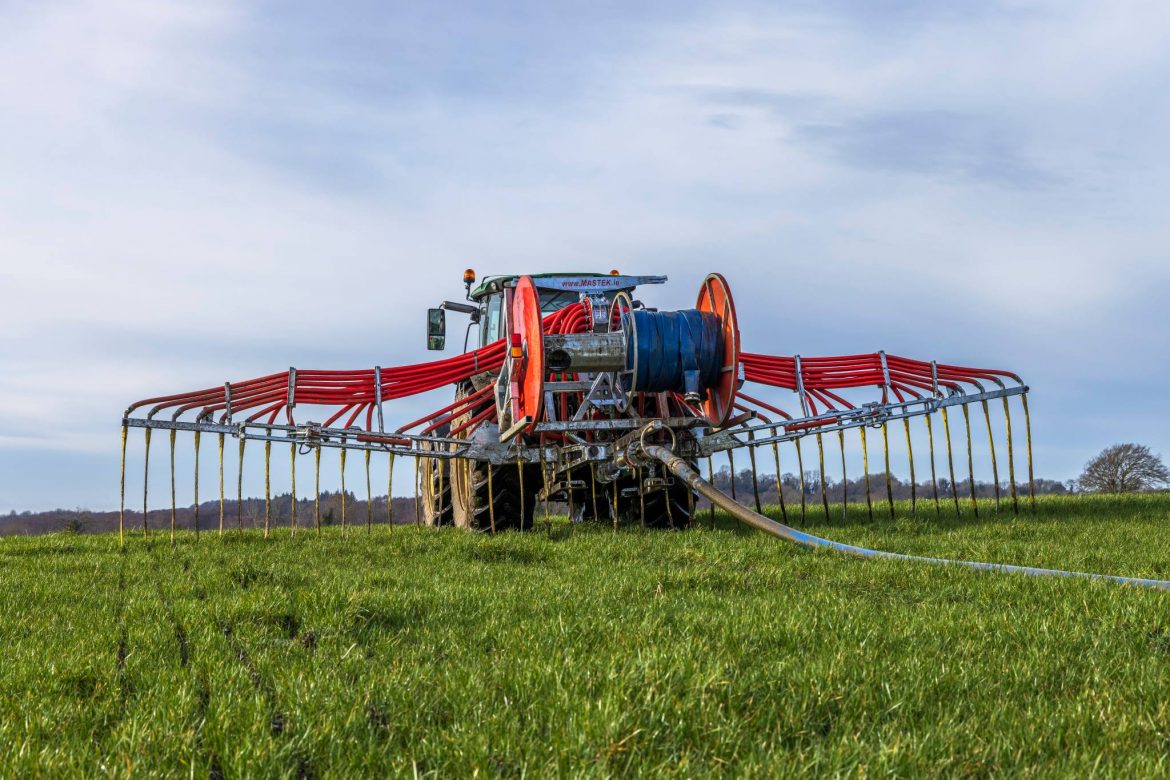The Association of Farm & Forestry Contractors in Ireland (FCI) submission to the Nitrates Action programme 2021 includes strategies that have practical applications for change. The Association says in its submission that Farm & Forestry Contractors are practical people, and they will drive solutions to the water quality challenge as their machine strategies and performances are a critical part of the processes of modern Irish farming and forestry. The Association believes that it is now the time for clear acknowledgement of that role so that Farm & Forestry Contractors can take on their responsibilities and use their technology experience and investment willingness with the confidence knowing that their role is a part of a valued pathway towards an enhanced water environment for all of Ireland.
FCI has outlined the following responses to the NAP Second Stage Consultation proposals are based on extensive engagement with FCI members from across Ireland, as follows:
- Slurry Storage and Management
- Lack of slurry storage capacity on farms
- Slurry export and import to tillage farms
- Chemical Fertiliser Controls
- Sewage/Industrial Sludges
- Soiled Water Management
- Licencing system for slurry spreading
- Grant aids for Registered Farm Contractors to invest in new traceable spreading technology
- Water quality issues in Irish Forestry
- Investment in farmer and contractor education
- Support for Livestock Manure and Grass-based bio-digesters in Ireland
Slurry Storage and Management
On the issue of Slurry Storage and Management, the FCI submission says that the fundamental issue is that the current Nitrates Directive Calendar Farming system of closed periods is simply not working; extending this system will not ensure that it can function any more satisfactorily. This system is too simplistic, and it is non-scientific, it has been proven not to be practical at farm level and it is now clearly not sustainable. “The Association believes that the NAP Second Stage Consultation proposals to extend the closed period for slurry spreading will not change that, they will in fact make the situation worse,” says FCI National Chair John Hughes.
The FCI National Chair added, “the fact that the current Nitrates Directive Calendar Farming system is not working has been confirmed by the deterioration in water quality as measured by the Environmental Protection Agency (EPA), despite the attempts at the closed period policing, involving the Department of Agriculture Food and the Marine (DAFM) and local authorities and despite the hugely costly mis-directed investment in new Low Emission Slurry Spreading (LESS) machinery systems funded by Government grant supports directly to farmers rather than to Farm Contractors. This has been clearly acknowledged in the Nitrates Action Programme, First Stage Consultation Review (4.4.5 LESS slurry spreading – “Contractors must be supported to purchase appropriate equipment.”),” he said.
FCI believes that bringing the closing date forward to September 30 followed by September 15 in 2023 will mean that all of this additional slurry will once again be attempted to be spread from January 15 irrespective of weather and ground conditions because slurry storage capacity on farms is currently not there and cannot be provided in this short timescale. Even larger volumes of slurry, from the extended storage period, will then be applied from January 15 across zones A, B & C leading to rainfall induced run-off into watercourse, streams and rivers.
This will also mean a huge demand for slurry spreading machine capacity from existing Farm Contractor providers at a time when skilled labour is less available. On many dairy farms, there is no labour available at that time of the calving season to operate the many grant aided LESS spreading machines, so this work will be carried out by Farm Contractors, creating a bottleneck of activity at a time when weather conditions are rarely ideal. Extending the closed period in this way only adds more environmental challenges.
The FCI National Chair added that what is lacking is a clear independent and technology-based, decision-making process to identify the best land spreading options based on measured information flows of air and soil temperatures, soil moisture levels, grass growing conditions, soil type information, predicted rainfall and slurry constituents as well as slurry volumes being spread, and field mapping locations linked to machine tracking. Each of these individual measurement indices are currently available but are they are not co-ordinated to ensure good decision making. “They are replaced by a simplistic calendar-based programme of work restriction that is not based on either science or technology but is one that that has resulted in a behaviour on farms that is not consistent with the water quality objectives,” he added.
FCI supports the evidence from the Agricultural Catchments Programme (ACP) which indicates that supporting farmers to make better decisions regarding how they manage nutrient applications is likely to be the single area with the greatest potential to improve outcomes for water quality on Irish farms – delivering better profits for the farmer while reducing risk of nutrient loss to water.
Farm Contractors regularly react to urgent requests from their client farmers to alleviate slurry storage problems due to significant under investment in the necessary slurry storage capacity on many high output farms. This latter issue can also be one of animal welfare as the cattle can be standing in liquid slurry.
“This clearly confirms that there is an absence of criteria for good decision making in relation to slurry spreading on many Irish farms, in terms of slurry application systems, timing and application rates, and/or in-field application strategies by applying slurry manures or fertiliser too close to a water source,” says John Hughes. FCI is seeking to work with DAFM, the Teagasc farm advisory and research bodies to develop technology-based solution systems that combine the input from local weather conditions, soil type information (both in conjunction with Met Eireann & Teagasc Soil Survey), Pasture Base data from 176,000ha or 99,792 paddocks and machine type information with machine recording data about the slurry volumes and its constituents and source (cattle or pig slurry) in an integrated way that can be fully traceable.
The Association believes that the development of a new technology option would allow farmers and their Farm Contractors to make the correct decisions to manage the process of spreading of the slurry in a more scientific way based on the ability of the soils absorb the nutrients and reduce nutrient loss to the environment during slurry spreading. The entire process can be linked to a FCI Farm Contractor Registration process which is in preparation.
On the issue of lack of slurry storage capacity, the Association believes that one of the reasons for the lack of slurry storage capacity on many farms is a complete lack of understanding among farm advisors and farm policy makers of the process of slurry management. FCI members are the front-line providers of the service on farms, they understand the challenges and have attempted to develop strategies to deal with these challenges in ways that are sympathetic to the natural environment.
Slurry management in Ireland is significantly different to that in other European countries meaning that single application policies cannot function nor be sustained. More than 80% of all silage is now made as baled silage (source: IFFPG) where during feeding a large proportion of the silage ends up in the slurry pit. This requires additional agitation/dilution in order to produce a slurry that has the viscosity and consistency to allow it to be used by LESS Trailing Shoe or Dribble Bar spreading systems.
FCI Member Farm Contractors know from hard experience that in most of these cattle sheds there is a requirement for 50% extra liquid dilution water to be mixed with the slurry in order to ensure that it can be spread using LESS systems. This additional 50% liquid volume is not accounted for in the design of the cattle sheds and slurry pits. It is also not accounted for in the calculations of the areas required to spread slurry in a single shed-clearing operation at the beginning of the Open Season in January of each year.
This challenge of agitating slurry with a lack of tank capacity for the additional dilutant to ensure the product can be spread with LESS equipment coupled with the shortage of land area for balanced spreading volumes, is leading to surface water run-off and deteriorating water quality. There is a requirement to revise upwards the slurry storage requirements to take account of the long silage mixed with the slurry and the resultant dilution needs along with the practical agitation issues associated with this type of slurry product.
“Our FCI members are environmentally ambitious,” says FCI National Chair, John Hughes. “We are seeking support to introduce new traceability programmes that use technology systems to automate the collection of work data created by their activities on over 80% of Ireland’s farms, in operations such as fertilizer spreading, organic manure management, environmental management and crop harvesting”, he added.
In practical and measurable terms, the 1,000 Farm & Forestry Contractors now listed on the FCI database, each work across an average of three Irish farms per day. This amounts to 3,000 farmer and Farm Contractor interactions each day or 18,000 farmer and Farm Contractor interactions each week of the working season. Given a working year that comprises of an average of 30 weeks of direct farm mechanisation work, this equates to over 500,000 farmer and Farm & Forestry Contractors interactions each year, across 139,600 Irish farm holdings. Farm Contractors are the dominant providers of slurry spreading machinery systems and their equipment applies the bulk of the 40 million tonnes (Mt) of animal manures produced annually on Irish farms (Teagasc research).
“This enormous level of annual direct interactions and work throughput between farmers and their Farm Contractor clearly shows why Farm & Forestry Contractors are at the heart of the agri-food system supporting farmers and forest owners with mechanisation services,” says John Hughes. “Our members contribute to the economic, environmental and social fabric of Ireland, in rural areas by providing skilled employment and providing access for farmers to technology at a scale that would not be commercially sustainable for many Irish farmers or forest owners. Without Farm & Forestry Contractors, the agri-food system would simply not exist.” he added.





